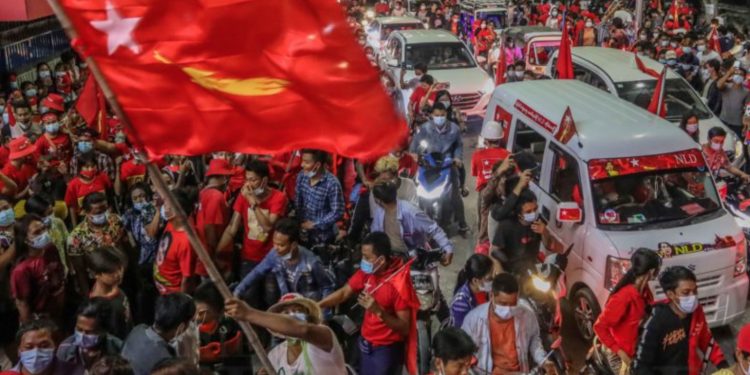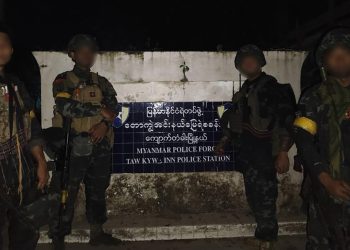The National League for Democracy, Myanmar’s most popular and most electorally successful political party, turns 34 today. To mark the occasion, we revisit this commentary from June last year showing that regime leader Min Aung Hlaing’s efforts to extinguish the party and remove its leader, Daw Aung San Suu Kyi, from public life have been even more extreme than his predecessor’s, and examining why, in the long run, they are bound to be even more counterproductive.
Needless to say, Myanmar’s most popular political party, the National League for Democracy, will be abolished sooner or later, as it is the wish of the coup leader, Senior General Min Aung Hlaing. No matter how many people supported it and no matter how many times it was democratically elected in landslide victories, it must be gone.
In the coup on Feb. 1 the top military leader used tyrannical means to make himself head of state by overthrowing the ruling NLD and arresting most of its leaders, including State Counsellor Daw Aung San Suu Kyi and President U Win Myint.
But that’s not enough if the coup leader is determined to achieve his political ambitions—to continue to rule the country and, perhaps, to anoint himself as president in the future. To be successful in that, he has to finish off the country’s most popular political leader, Daw Aung San Suu Kyi, bury her party, the NLD, and render its new generation extinct from Myanmar’s soil.
It’s a political annihilation that he seeks. It’s also an act against the people’s will, because most of the more than 27 million citizens who cast ballots in the general election last year voted for the NLD. The Spring Revolution following the coup has also seen a significant number of teenagers—who were not eligible to vote in the last election—expressing support for the NLD and Daw Aung San Suu Kyi.
However, it will be a piece of cake for the regime.
To finish the political life of popular 75-year-old Daw Aung San Suu Kyi will just need a lengthy imprisonment (she is facing six legal charges) and to bury the NLD will need only an official announcement to disband it.
Only after this grand scheme is implemented will coup leader Min Aung Hlaing feel that he can run the country safely. Otherwise, the NLD will haunt him and his regime as in the past. And it might even take power back from him again with the overwhelming support of most people across the country, as it did in 2015 through the election.
Undoubtedly, it must be one of the main items on the agenda of the coup leader since he decided to seize power on Feb. 1, or even before that.
So, it’s the Union Election Commission, hand-picked by the regime, that will carry out the wish of the coup leader.
“What should we do with the NLD, which plotted against the law [to win the election]? The party must be abolished. And we must consider taking action against those who rigged the vote as traitors to the country,” said UEC chairman U Thein Soe, a former major general in the military, in a meeting with political parties held on May 21.
The NLD was now dubbed “traitors” for its “rigged” vote. But no international or domestic election monitoring groups found any evidence of electoral fraud. The Asian Network for Free Elections, which released its final report in May, said the outcome of the vote was “by and large, representative of the will of the people of Myanmar.”
But the regime and its UEC are not interested in what the election monitoring groups say, because that’s not the story the junta is creating.
On May 15, the regime’s spokesman said at a press conference that action must be taken against the NLD under the Political Parties Registration Law and the military-drafted 2008 Constitution, because the party supports the National Unity Government (NUG) and the Committee Representing Pyidaungsu Hluttaw (CRPH), both of which the regime has declared to be terrorist and unlawful associations. The CRPH represents lawmakers, mostly from the NLD, who were elected in November. The NUG was formed by the CRPH as a shadow government to rival the military regime.
Then the UEC asked the Ministry of Home Affairs to conduct a review to determine whether any of the country’s political parties have breached the pledges they made as part of the registration process. The move could be viewed as an attempt by the regime to provide legal cover for dissolving the NLD. It should be noted that the request to the ministry came three days after UEC chairman U Thein Soe publicly said that the NLD must be abolished because “it plotted illegally” to win the election.
In fact, this is not a new crackdown against the NLD. The previous military regime and its generals ruthlessly pursued the same strategy from the time the NLD was born in 1988 following the nationwide pro-democracy uprising. Of course, the NLD wasn’t the only victim, but all pro-democracy forces were crushed during that time.
Former military dictator—and mentor of Snr-Gen Min Aung Hlaing—ex-supremo Than Shwe, locked up NLD leader Daw Aung San Suu Kyi for 15 years under house arrest starting in 1989, incarcerated many hundreds of NLD members and their elected lawmakers in notorious prisons for years and crippled the party and almost all of its political operations for two decades.
Under those conditions, with its key leaders and its political operations contained, the NLD was merely existing. It became truly active again only after Daw Aung San Suu Kyi was released in November 2010 and the party was allowed to operate more freely in a new political environment, albeit one that was dominated by the military under the constitution designed by then Snr-Gen Than Shwe.
The former military leader must have thought the NLD was finished under his political system controlled by the 2008 constitution. But he was wrong and so were his followers, like general-turned president U Thein Sein.
The NLD got overwhelming support from a majority of people across the country. As in the 1990 election, it won landslide victories in 2015 and 2020. That’s simply democracy.
Now, what Snr-Gen Min Aung Haling seems to have learned from his former master is not to let the NLD exist at all. So, no question that this time, under his regime, must be the worst for the party.
Since the coup, the regime has arrested more than 200 NLD members, including government ministers, lawmakers, members of the party’s Central Executive Committee, heads and members of state and regional offices, as well as youth members. Many of the NLD members have been political prisoners before, having been jailed under the previous junta. Its forces cruelly killed several members of the NLD during their detention.
Additionally, other members who are still free have gone into hiding. All the NLD offices across the country stopped operating in the past few months.
Under the rule of Snr-Gen Min Aung Hlaing, there will be no room or no survival kit for the NLD.
But if anyone believes in democracy—a genuine democracy which is based on the will of the majority of the people, it’s totally impossible for anyone, even powerful dictators, to finish off the NLD, its leader Daw Aung San Suu Kyi (regardless of the manner in which she eventually passes away) and their political capital, as they are based on the will of the majority of the people in the country. Aware of this, Daw Aung San Suu Kyi recently said in response to the regime’s attempt to abolish it that “the NLD will be there as long as the people are, because the party was founded for the people.”
So, Min Aung Hlaing appears intent on annihilating the NLD—a much harsher policy than even his ex-boss Than Shwe implemented. But this time, the resistance against this kind of action will be stronger. The coup leader’s efforts to kill the NLD may be stronger this time, but they will be even more counterproductive.
Naing Khit is a commentator on political affairs.

















